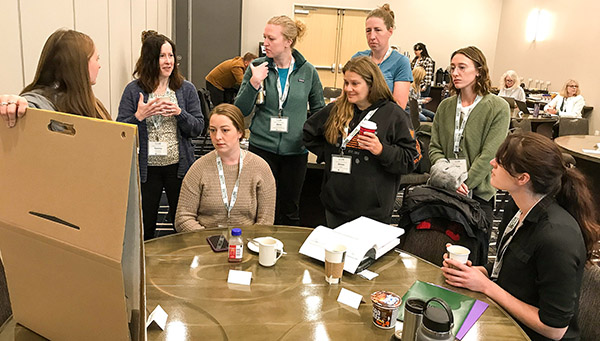Fellowship
P4W Wildlife Rehabilitation + Veterinary Fellowship
P4W’s annual fellowship aims to improve animal welfare by elevating participants’ competency and knowledge across a broad range of wildlife rehabilitation topics. Wildlife rehabilitators and licensed veterinarians who seek to advance their career, build community, share knowledge, and increase access to resources on behalf of wildlife are eligible and encouraged to apply.
The P4W Fellowship is a part-time commitment designed to integrate into the participant’s existing work schedule. Fellows are compensated for their time and travel, with P4W managing many supplemental costs directly.
 The P4W Fellowship is divided into five main elements – an in-person kickoff event, virtual rounds, in-person attendance at the NWRA Symposium, a group project designed to benefit the wildlife rehabilitation sector, and a final closing event.
The P4W Fellowship is divided into five main elements – an in-person kickoff event, virtual rounds, in-person attendance at the NWRA Symposium, a group project designed to benefit the wildlife rehabilitation sector, and a final closing event.
The following is a more detailed breakdown of these elements:
Kickoff Workshop: This three-day interactive workshop (typically scheduled in September) focuses on confirming and developing baseline knowledge of animal welfare, forming a community of practice, and getting to know your fellow cohort members, staff, and mentors. Fellows learn about the perspectives of veterinarians, wildlife rehabilitators, and regulatory agency personnel involved in the wildlife rehabilitation sector. By the end of this workshop, Fellows begin to create a common understanding of the concept of animal welfare in the rehabilitation context and have practiced applying animal welfare concepts and assessment frameworks in wildlife rehabilitation settings.
Fellowship Rounds: Virtual meetings are held on a biweekly basis from October through May following the Kickoff Workshop. P4W staff, partners, and guest experts lead topical discussions and facilitate group collaborative problem solving on real-life case scenarios, helping Fellows expand their knowledge base for triage, treatment, and rehabilitation of wildlife. These rounds provide a chance to apply animal welfare concepts within the context of real-world decision making under the guidance of seasoned expert clinicians and rehabilitators. The knowledge shared in the course of these rounds supports the greater wildlife rehabilitation community’s advancement toward professionalism and establishing universal standards of care.
NWRA Symposium: Sponsored by the National Wildlife Rehabilitation Association, this weeklong symposium is an annual in-person touchpoint for hundreds of WR professionals and veterinarians. It serves as another major opportunity for veterinarians and wildlife rehabilitators to expand their knowledge base across a broad base of relevant topics as well as build their professional network. Fellows spend one additional working day on the collaborative group project in addition to attending NWRA conference and events.
Collaborative Project: Working as a unit, each cohort of Fellows executes a set of small-group projects focused on developing deliverables and shareable resources for the broader wildlife rehabilitation community. In doing so, fellows promote community building with each other and the broader sector. Implementation and/or dissemination of the finished project deliverables will ideally contribute to the improvement of animal welfare; topics of previous projects have included broad impact subjects like sector-wide networking, protocol development, public outreach + education, and training opportunities for new rehabilitators.
Cohort Graduation: As the fellowship comes to a close, Fellows, P4W staff, and partners gather as a group for a final time to reflect on the cohort's progress and welcome the incoming Fellows. This one-day event will provide both closure and momentum for you as you graduate from the program.